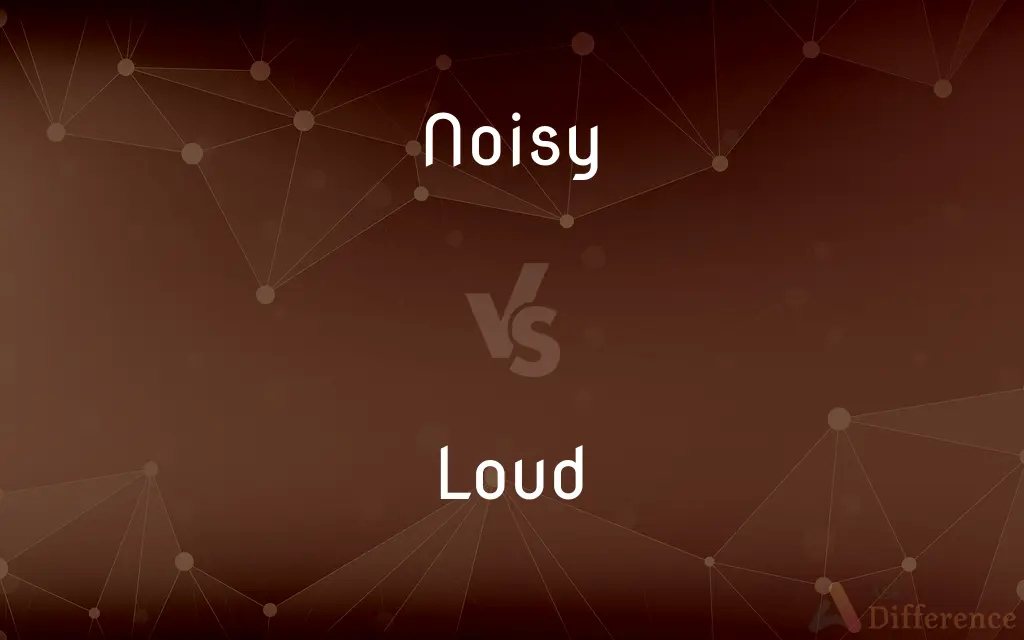Noisy vs. Loud — What's the Difference?
By Tayyaba Rehman & Urooj Arif — Updated on April 23, 2024
Noisy refers to an unpleasant or unwanted sound, while loud describes high sound intensity, irrespective of its desirability.

Difference Between Noisy and Loud
Table of Contents
ADVERTISEMENT
Key Differences
Noisy implies sounds that are often chaotic and undesirable, creating a sense of disruption. Loud, on the other hand, simply refers to a high volume that can be either disruptive or appreciated, depending on the context.
Noisy environments are typically characterized by a mix of sounds that lack harmony, such as busy city streets or crowded markets. Loud environments, whereas, might be intentionally created for effect, like at concerts or during public announcements.
Noisy often carries a negative connotation, suggesting an irritation or disturbance. Loud can be neutral, describing only the strength of the sound without an inherent negative or positive quality.
Noisy can involve multiple sources of sound, leading to a cacophonous experience. Loud sounds can emanate from a single source, such as a speaker at a rally or a blasting siren.
In terms of perception, noisy situations are generally less controllable and more unpredictable, which can increase stress levels. Loud sounds, on the other hand, can be either sudden or sustained, with varying impacts on one's hearing and wellbeing.
ADVERTISEMENT
Comparison Chart
Connotation
Generally negative
Neutral
Sound Sources
Multiple, varied
Single or multiple
Volume
Variable, not necessarily high
High volume
Desirability
Usually undesirable
Can be desirable or undesirable
Impact
Often chaotic and disruptive
Intense, can be overpowering
Compare with Definitions
Noisy
Characterized by dissonance.
The party was noisy with different music playing at once.
Loud
Emphatic or conspicuous.
He wore a loud tie to the meeting.
Noisy
Associated with disturbance.
He moved out of the noisy neighborhood for peace.
Loud
High volume.
The loud music at the concert was exhilarating.
Noisy
Causing noise.
The noisy engine of the old car was hard to ignore.
Loud
Strongly audible.
The siren was loud enough to hear from blocks away.
Noisy
Involving many sounds.
The market was noisy with vendors shouting offers.
Loud
Capable of producing great noise.
She shouted in a loud voice to get attention.
Noisy
Making or given to making a lot of noise
A noisy, giggling group of children
Diesel cars can be very noisy
Loud
Intense in expression.
Their loud laughter filled the room.
Noisy
Accompanied by or introducing random fluctuations that obscure the real signal or data.
Loud
Producing or capable of producing much noise
They were kept awake by loud music
His voice is loud and challenging
Noisy
Making noise
A small, noisy dog.
Loud
With a great deal of volume
They shouted as loud as they could
Noisy
Full of, characterized by, or accompanied by noise
A noisy cafeteria.
Loud
Characterized by high volume and intensity. Used of sound
A loud whistle.
Noisy
Making a noise, especially a loud unpleasant sound
The noisy crowd.
Loud
Producing sound of high volume and intensity
A loud construction work site.
Noisy
Full of noise.
A noisy bar
Loud
Clamorous and insistent
Loud denials.
Noisy
Unpleasant-looking and causing unwanted attention
Noisy clothes
Loud
Having strikingly bright colors
A loud necktie. See garish.
Noisy
Making a noise, esp. a loud sound; clamorous; vociferous; turbulent; boisterous; as, the noisy crowd.
Loud
Having a very strong or overpowering odor.
Noisy
Full of noise.
Loud
In a loud manner.
Noisy
Full of or characterized by loud and nonmusical sounds;
A noisy cafeteria
A small noisy dog
Loud
(of a sound) Of great intensity.
Turn that music down; it's too loud.
What was that? It sounded like a really loud sneeze.
Loud
(of a person, thing, event, etc.) Noisy.
A loud party that went on all night
Loud
(of a person, event, etc.) Not subtle or reserved, brash.
Loud
(of clothing, decorations, etc.) Having unpleasantly and tastelessly contrasting colours or patterns; gaudy.
A loud style of dress;
Loud colors
Loud
High-quality; premium; (by extension) having a strong or pungent odour indicating good quality.
Loud
(colloquial) A loud sound or part of a sound.
Loud
High-quality marijuana.
Loud
Loudly.
Loud
Having, making, or being a strong or great sound; noisy; striking the ear with great force; as, a loud cry; loud thunder.
They were instant with loud voices, requiring that he might be crucified.
Loud
Clamorous; boisterous.
She is loud and stubborn.
Loud
Emphatic; impressive; urgent; as, a loud call for united effort.
Loud
Ostentatious; likely to attract attention; gaudy; as, a loud style of dress; loud colors.
Loud
With loudness; loudly.
To speak loud in public assemblies.
Loud
Characterized by or producing sound of great volume or intensity;
A group of loud children
Loud thunder
Her voice was too loud
Loud trombones
Loud
Tastelessly showy;
A flash car
A flashy ring
Garish colors
A gaudy costume
Loud sport shirts
A meretricious yet stylish book
Tawdry ornaments
Loud
Used chiefly as a direction or description in music;
The forte passages in the composition
Loud
With relatively high volume;
The band played loudly
She spoke loudly and angrily
He spoke loud enough for those at the back of the room to hear him
Cried aloud for help
Common Curiosities
Can loud sounds be pleasant?
Yes, loud sounds can be pleasant if they are desirable and expected, like in music or entertainment.
What does it mean when a place is described as noisy?
It means the place has a lot of different sounds, often unpleasant or disturbing.
How do I reduce noise in a noisy room?
Using soundproofing materials or reducing the number of sound sources can help reduce noise.
Can music be considered noisy?
Music can be considered noisy if it contains dissonant or chaotic elements that are generally unwelcome.
Can a loud sound be a single tone?
Yes, a loud sound can be a single, powerful tone like a horn or an alarm.
How does one measure loudness?
Loudness is measured in decibels (dB) using sound level meters.
Is a noisy environment always loud?
Not necessarily; a noisy environment can have low to moderate volume but with many clashing sounds.
What are typical sources of noisy disturbances?
Traffic, construction, and crowded areas are common sources of noisy disturbances.
What is the impact of loud sounds on hearing?
Prolonged exposure to loud sounds can lead to hearing loss or damage.
What is the legal limit for noise in residential areas?
It varies by location, but typically there are restrictions during night hours.
Can animals be noisy?
Yes, animals like birds, dogs, and monkeys can be considered noisy in their natural behavior.
Are loud sounds always harmful?
Not always, but exposure to very high decibel levels can be harmful over time.
Share Your Discovery

Previous Comparison
Prepare vs. Plan
Next Comparison
Drink vs. SipAuthor Spotlight
Written by
Tayyaba RehmanTayyaba Rehman is a distinguished writer, currently serving as a primary contributor to askdifference.com. As a researcher in semantics and etymology, Tayyaba's passion for the complexity of languages and their distinctions has found a perfect home on the platform. Tayyaba delves into the intricacies of language, distinguishing between commonly confused words and phrases, thereby providing clarity for readers worldwide.
Co-written by
Urooj ArifUrooj is a skilled content writer at Ask Difference, known for her exceptional ability to simplify complex topics into engaging and informative content. With a passion for research and a flair for clear, concise writing, she consistently delivers articles that resonate with our diverse audience.
















































